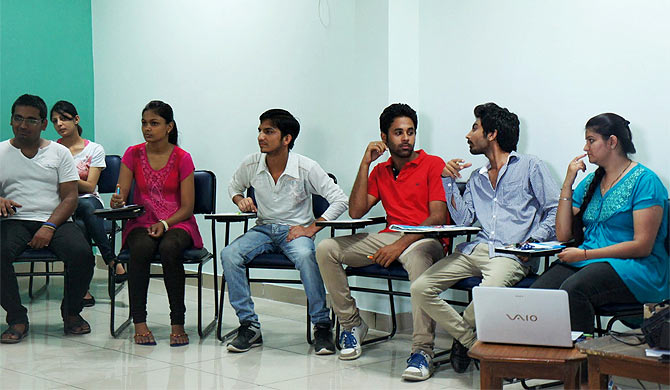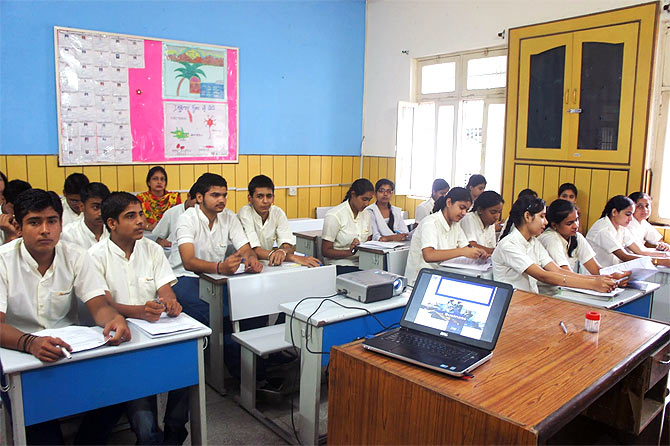
Megha Aggarwal of LEAP is working hard to provide Indian students with both vocation and life skills to make them employable.
India is at a dangerous crossroad, one which if it does not navigate through carefully, could end in disaster. The demographic dividend, long-touted as something positive, looks like a millstone around the country's neck. When the rest of the world's workforce is growing old, India's is growing younger: the projected median age of the average Indian will be 29 years by 2020.
But there's a problem.
Most of them will be unemployable because they will either be uneducated, under-educated or be lacking the necessary skills to be employed.
The Indian government, cognizant of this fact, plans to skill 500 million individuals by 2022. But like most grandiose plans, this too seems far-fetched. It needs all hands on deck to make sure that India does not let this once a century opportunity pass by.
There are many organisations trying to do some of the heavy-lifting to skill our youth. One of them is the Megha Aggarwal-founded LEAP that is in the business of providing students with both vocation and life skills to make them employable.
Aggarwal has a rich pedigree. She's an ex-investment banker with stints in London and New York. She was a Chevening Scholar at the London School of Economics, and an alumnus of Oxford University and St Stephen's College, Delhi.
Besides she has experience in skill development, having worked at several organisations including the University of Pennsylvania, Asian Development Bank, the Planning Commission, the Azim Premji Foundation and the Wadhwani Foundation.
In this comprehensive interview with SocialStory Aggarwal talks about her inspiration, business model of LEAP, impact so far and what the future holds.
What was the inspiration behind starting LEAP?
LEAP stands for Learning, Employability And Progress.
I was fortunate to get the opportunity to live and work in different countries. My travels taught me that in any country, where one is born seems to determine the opportunities one gets. This is starkly visible in a country such as ours. I believe that in India, the real challenge facing us is our failure to provide highly motivated youth with the appropriate skill sets that enable them to participate in the Indian growth story.
This prompted me to end my stint in banking and move into the field of education, where I was fortunate to have a steep learning curve working with senior thoughtful commentators both in India and internationally.
During these years, my focus was on identifying gaps in skill development research, conducting large scale projects to address these gaps and working with organisations that are thoughtful about skill development in India and abroad to really understand the space better.


Explain the problem and how LEAP is solving it.
The paradox of skill development is that we are in a situation where students do not find enough jobs, and employers do not find enough employees. This is not a new issue, and the policy in India has shifted to strongly promote the formation of a skilled population. However, despite the influx of participants in the market, there seem to be few models that can break the trilemma between high quality, low costs and a large scale, with most participants so far being able to create models that fit one or two of these criteria, but not all.
LEAP was started in 2013 aiming to address these challenges by skilling both motivated students and those not currently in the formal education system in non-tier 1 towns in sectors that are creating employment opportunities regionally and nationally.
We believe that motivated students should work in jobs that are deeply connected with their dreams and aspirations. Given the paucity of awareness around potential career pathways in India, LEAP works closely with industry and employers to give industry relevant skills to students and also fulfill the needs of industry by connecting these skilled workers to employers.
Explain the LEAP methodology of skill training.
LEAP is trying to create a young workforce that is highly motivated with a strong work ethic by understanding student aspirations, informing them about potential opportunities and matching them with employment opportunities and the needs of industry/employers.
Earlier this year, LEAP started its first programme called Education for Employment which is for students enrolled in any form of formal post secondary education. For e.g. a polytechnic, a degree college, an ITI or a postgraduate institution.
LEAP conducts an extensive skill gap study in each potential location to identify employment opportunities and the skills required by employers. We then work closely with industry to ensure that teaching content is devised to meet the skill requirements of the employer. LEAP is all about experiential learning -- you can forget what you learn by reading, but once you've done something, experienced it yourself, it stays with you for a long time. LEAP addresses this in several ways.
Firstly, by creating an environment conducive to learning -- a large part of the challenge is creating a world where students are comfortable and don't fear being judged by teachers/peers, and do not form gender driven groups. In our classes, it is critical that they are able to express themselves freely. We support this with an activity based approach to learning through the use of business simulations, management games and industry projects.
For example, students in one of our centres in Yamuna Nagar are working on a real-life industry project with a leading national jewellery brand. Consequently, for our students, these projects are highly challenging, where they are confronted for the first time with real life business pressures in a very professional environment.
Additionally, we group highly motivated individuals from households with very diverse socio-economic profiles in small batches (from day labourer to industrialists). This helps them work together with peers from diverse backgrounds and with very different personality types. The module 'E for E' teaches life-long skills, along with spoken English and communication. Students are also taught IT and finance skills for business and sector specific modules, in order to prepare students to be industry ready.

What's the story so far?
LEAP has been off to a very exciting start with Education for Employment. We made our start earlier this year with the first few initiatives running in a town called Yamuna Nagar in Haryana. One of our partners is a leading degree college in Yamuna Nagar, another one a management college and yet another a leading polytechnic in a village close to Yamuna Nagar. We are currently in the process of placing the students from our first batch with some of the leading employers in the country.
We are also working towards creating training and employment opportunities for workers currently in the informal economy by working closely with regional employers. We expect to start operations for this next year.
Have you been funded? If yes, by whom? How much and what have you used the capital for?
We are currently being funded by angel investors and are using the capital to pilot different business models -- one of our centres is following a business to business model and another one a business to customer model. At this stage, while we have received inbound interest from funders, we are currently in a test and learn mode, and are keen to use this period to fully understand our market prior to engaging with outside investors.
We want to ensure high quality and robust scalable processes: learn, adapt, and then expand.
What are your major challenges?
As with any institution in this space, the process of mobilising and sourcing students is a challenge. Skill development suffers from a poor reputation. This is especially true in small towns where students are hesitant or unable to pay a fee for skill development.
There are many stake holders involved in the decision process for students -- parents, relatives and teachers. There is no single decision maker, but quite a few people with veto powers. A student often needs to get by in from many people before embarking on a career of his/her choice.
Finally, typical of any mission driven organisation, selecting the right team is an area that requires a lot of focus and time.

How are you all solving them?
We are aiming to create an energetic and dynamic organisation. A key part of this process is to continuously innovate till we get the model to a level where we feel it is scalable. Solving these issues requires two things. First, a careful selection of people who are deeply aligned to LEAP's goals. Second, as a team, we need to constantly remember that we are here for the students, and not the other way round. When faced with choices, every decision by each LEAP member is made with keeping that single goal in mind.
What has been the impact so far?
We are currently in the midst of our pilot batches. We are miles away from achieving the effectiveness we aspire to yet it is gratifying to see the impact in such a short period of time.
Recently some of our students from our first batch accompanied us to a student address in a polytechnic where we were offering Education for Employment. They were confident, proud, passionate and able to address audiences of over 100 students each, multiple times in a day. During the sourcing process when we asked potential students why they were interested in joining LEAP, a vast majority of them referred back to these students and how they wanted to be like them.
We are also getting feedback from our partner colleges saying that LEAP students are standing out in their daily classes and interactions. They say they are generally much more curious, interactive and much more confident as compared to what they used to be as well as relative to their non-LEAP peers.
What kind of impact do you expect in the next 3-5 years?
We expect to be in multiple locations across states and working firmly in both the formal and the informal economies in the next 3-5 years. In the formal economy we hope to create a highly motivated work force at entry level positions for a range of industries. For the informal economy, which is where 90 per cent of Indian employment is generated, we expect to create skill solutions that create pathways between the informal workforce and the formal economy as well as those that enable recognition of prior learning.
We aspire to create an example for skill development providers and policy makers alike that proves that a skill development organisation can impart the highest quality whilst achieving scale and profitability. LEAP will continue to work closely with policy makers and industry to work towards creating an outcome where hard work and motivation counts for at least much as where one is born in India.